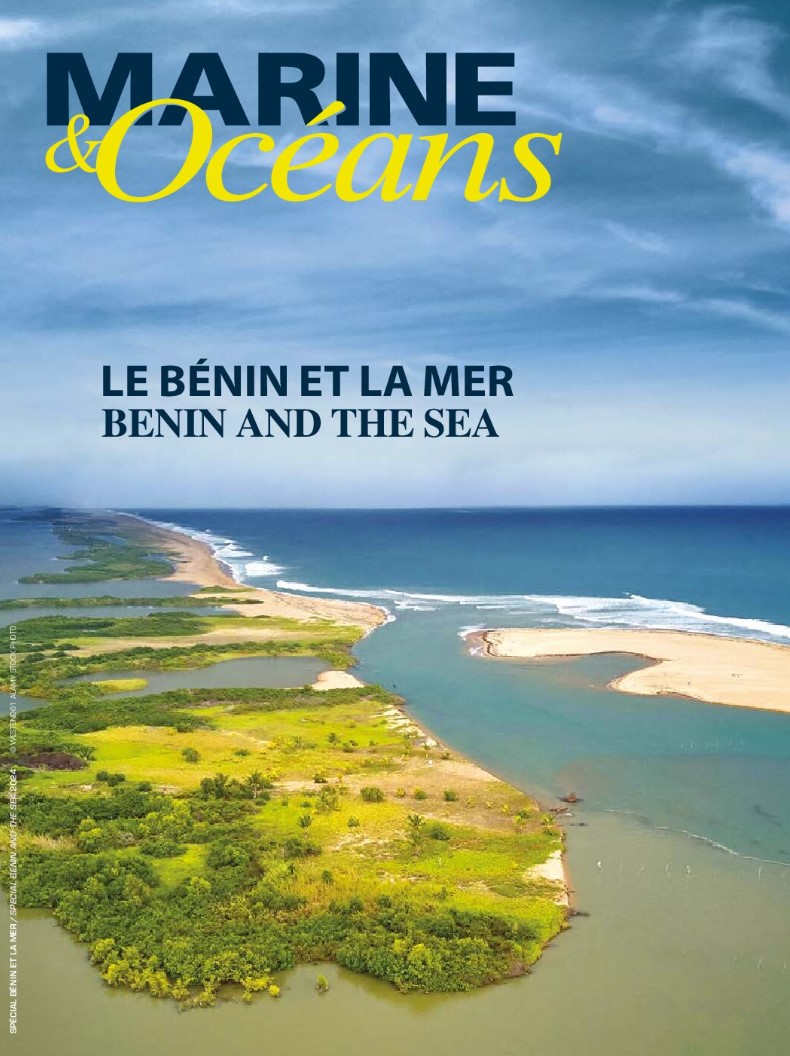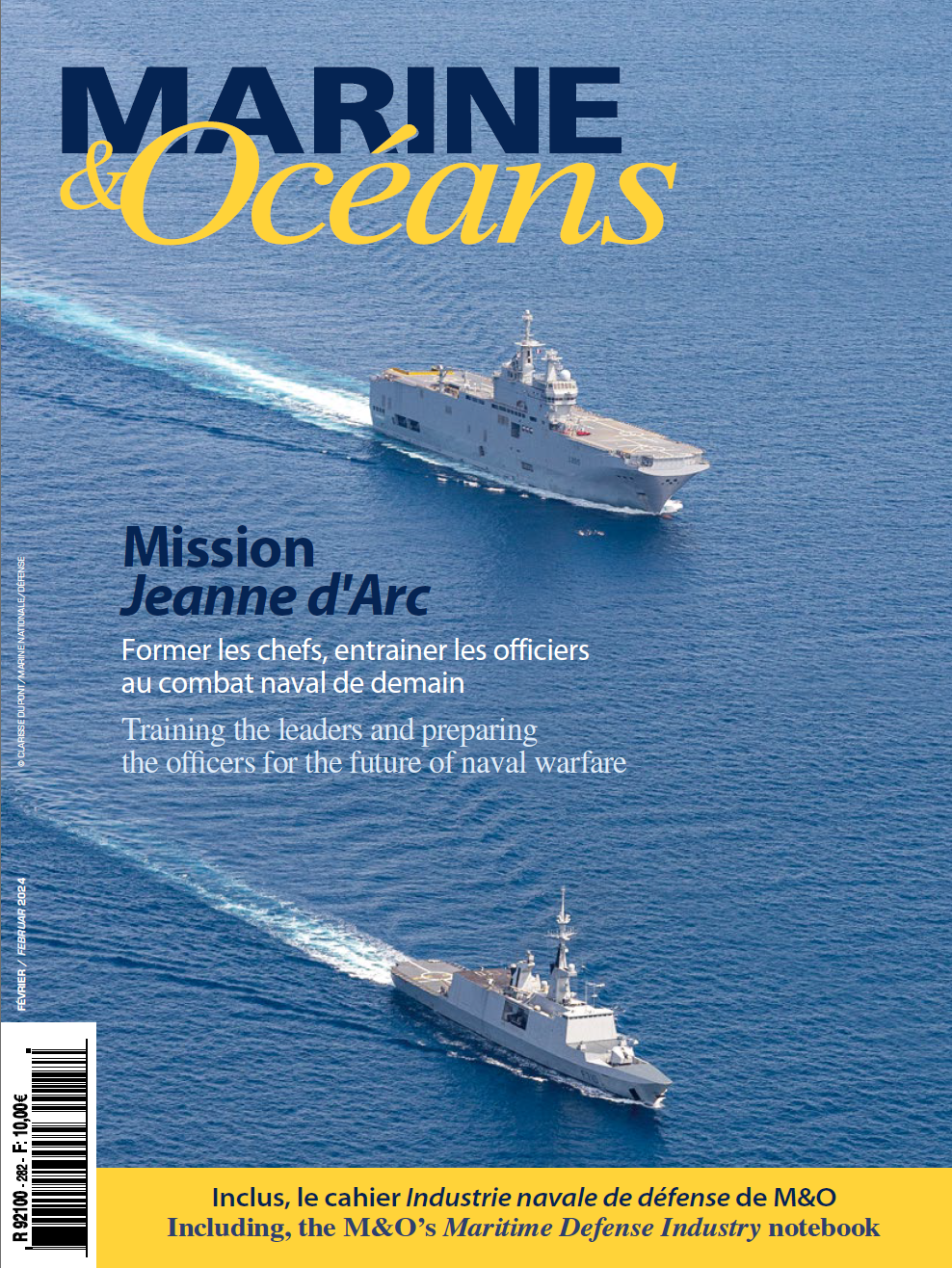Do Icelanders generally consider this upheaval as a threat or as an opportunity ?
The melting of the major ice sheets, especially in Greenland, will through rising sea levels be for Iceland as all other countries a considerable threat. On the other hand, the opening up of new sea routes, through the Arctic and northern parts of the globe, will bring Iceland, at least for a while, into the central lines of global shipping. Furthermore, in Iceland, as well as in other northern countries, the growth of tourism in recent years has partly been due to increasing interest in the Arctic and the northern regions.
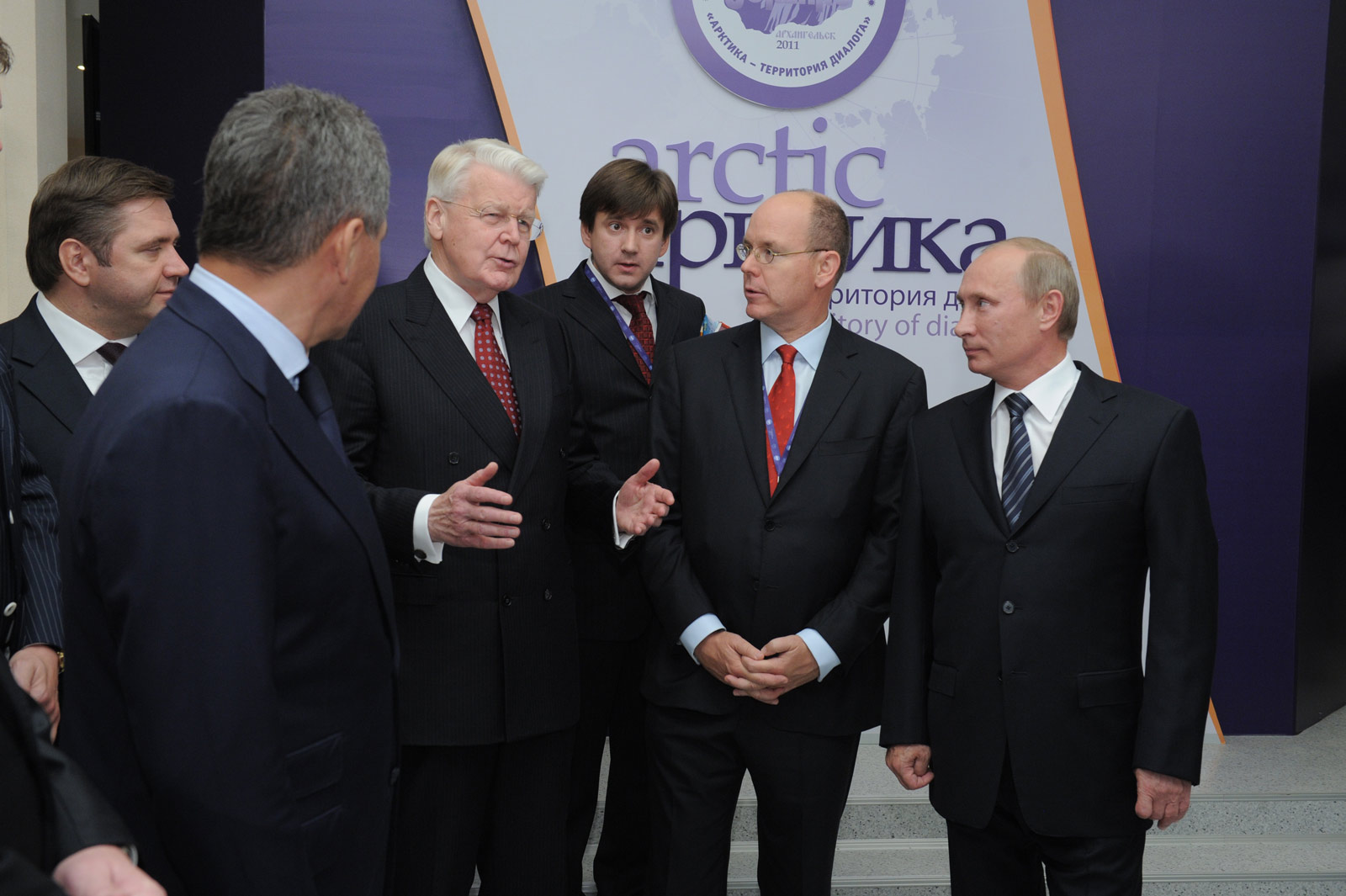
In your case, your interest for the rapidly changing Arctic is well known. During the last few years, you have participated in many international conferences on the Arctic and you have made many official visits to Arctic States. How is that the Arctic became such a high-priority for the President of Iceland ?
Iceland was together with the other seven Arctic states, in the 1990s, a founding member of the Arctic Council and thus, throughout my Presidency, Arctic co-operation and Arctic issues have increasingly become a formidable pillar in Iceland’s relations to other countries. In addition to the Arctic states, including Russia and the United States, countries in Europe and Asia, e.g. China, India, South Korea and Singapore, are increasingly seeking a dialogue with Iceland on Arctic issues. I have also stressed the importance of scientific co-operation, and also among non-governmental organizations, indigenous people, environmental activists and regional leaders within the Arctic. Thus, for example, I helped to establish the Northern Research Forum in the first years of my Presidency.
Isn’t that upseting to hear from some Arctic Council representatives that Iceland is not an Arctic Coastal States (but an Arctic States) when several scientific and conventional arguments tend to prove the opposite. Not to mention for example, the OSPAR (Oslo-Paris) convention (Convention for the protection of the marine environment of the North-East Atlantic) which defines “Arctic waters” as north of 60 degree North.
Iceland has emphasized very strongly that the strength of the Arctic Council, composed of eight Arctic countries, should be maintained and the success of recent negotiations within the Council has proven the wisdom of that policy. Therefore, it is not productive to start emphasizing subgroups like ‘Arctic Coastal States’ within the Arctic family of nations. The constructive evolution of the Arctic Council proves beyond doubt that comprehensive co-operation is the way forward.
The Arctic is an area which may change from total preservation to full exploitation. This requires establishing rules. What governance do you see for the Arctic ?
The Law of the Sea, UNCLOS, and the Arctic Council provide in its present form the framework for the governance of the Arctic; at least a sufficient foundation on which to discuss and meet the challenges ahead. Furthermore, the culture of constructive co-operation, which has prevailed within the Arctic Council, will serve us well, especially since it is supported by strong connections to the scientific community, to non-governmental organizations and associations of the indigenous people who have lived in the Arctic for many centuries, if not thousands of years.
Is Iceland favorable to the opening of the Arctic Council to non-riparian states in particular because of the dangers associated with its use (risk of maritime accidents, pollution, etc …) which can also affect them ?
Iceland has been favourable to the request by non-Arctic states to be a part of the dialogue within the Arctic Council but their role has to be defined in such a way as to maintain the existing constructive structure of the Council as well as the result-oriented practices which have already become the positive track record of the Council. It is clear that major maritime and trading countries as well as strong scientific institutions in e.g. Europe and Asia will have a legitimate role to play in the future of the Arctic.
Maritime transport including petroleum and chemicals, exploitation of submarines resources, new fishing areas, tourism … how far should we, or can we go in the exploitation of the Arctic ?
We have to remember that the exploitation of the Arctic is a recent phenomenon and therefore we have to proceed carefully on the basis of scientific information and environmental concerns. In the first decades of the 20th century large parts of the Arctic were still unknown. It was not until the 1990s that the Arctic became a region of co-operation and the growing interest of other countries has, in recent years, made the Arctic a new global theatre of economic interests and political concerns. The Arctic Council has started to deal constructively with these future trends by e.g. reaching an agreement on search and rescue and a new protocol on oil spills. However, the discussions on Arctic fishing, responsible tourism, and other economic dimensions of the 21st century Arctic are still in their early stages.
What are the projects and possible ways to monitor and secure this new space of navigation to reduce the risk of collision and sinking with the consequences that we imagine on the environment ?
As I indicated in my answer to the previous question, the Arctic Council is already formulating agreements and regulations with respect to navigation and other activities. But it is also clear that more needs to be done. I have been encouraged by the responsible vision I have found in my discussions with the leadership of Russia in recent years, since the long Russian coastline is of particular importance in this respect.
Are you worry about an Intensive exploitation of offshore petroleum resources in Arctic after what happened with the platform Deepwater Horizon in 2010 ?
We should all worry about the risks involved in the exploitation of offshore oil resources in the Arctic. It is encouraging that many oil companies have in the last few years become more responsible and concerned in this area. We need to create a constructive forum where the drilling companies, national and regional authorities, scientists, environmentalists and representatives of the indigenous people come together to examine those issues.
What are the projects of Iceland in Arctic under these new perspectives ? To what extent and in which economic sectors, the country could benefit from the development of the newly opened Arctic ocean ?
There are many ways in which Iceland is already engaged in the opening of the Arctic, both the oceans and other regions. Our increasing co-operation with Greenland, both in air transport, construction and other areas, shows the transformation which is now taking place. Furthermore, discussions with European port authorities on how Iceland could be a location for ports on the new shipping routes, either the northern sea route or directly across the north pole, is another example. The extraordinary growth in northern tourism, both cruise ships and in other forms, also shows that now each year thousands of people come into the Arctic. The small nations and communities in Iceland and other Arctic regions have to develop plans on how to deal with this new form of northern and Arctic tourism, which was almost unknown 20 or 30 years ago.
Is the project for a deepwater port to make Iceland a hub in the region real and committed ? If yes, how do you finance its construction ?
As I mentioned in my previous answer, discussions with European port authorities have started. Representatives of countries in Asia, e.g. Singapore and China, have also expressed an interest in exploring the possibilities of deepwater ports in Iceland. However, these discussions are as yet in their early stages, so the financial dimension has not yet been brought to the table.
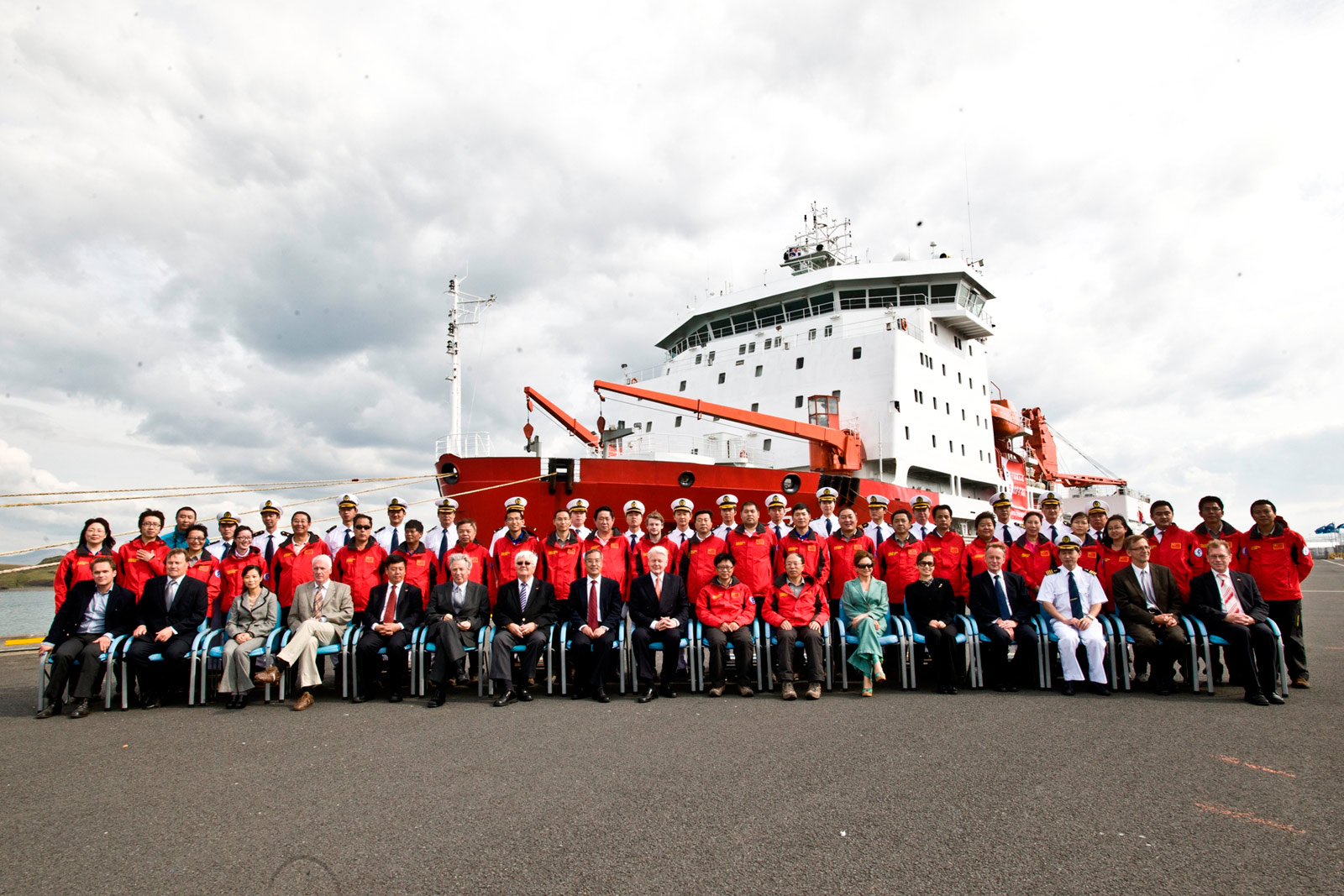
Iceland signed in 2012 six cooperation agreements with China, including a framework agreement on the Arctic. For which projects exactly ?
The journey by the Chinese icebreaker Snow Dragon with about 60 Chinese scientists from Shanghai through the Arctic to Iceland in 2012 demonstrated the strong scientific interest which China has in the Arctic. At a public forum, hosted by the University of Iceland, where agreements with the Polar Research Institute of China (PRIC) for scientific co-operation were signed, the Chinese explained how the melting of the Arctic sea ice in 2007 led to severe weather hazards in China in the following winter. In the beginning of 2013, we have also heard reports of similar extreme weather events in China, following the melting of the Arctic sea ice in 2012. The Chinese scientific community is also interested in observing the northern lights, the aurora borealis, from a small station in Iceland in co-operation with the Icelandic Research Council and our academic community.
It is no secret to anyone that China seeks to establish itself in the Arctic region not only for access to its vast energy resources it urgently requires but also for the geopolitical interest it represents. How do react your partners in the Arctic Council’s, especially United states and Canada, to the agreements you have with China ?
We have not heard any comments from the United States or Canada, or other partners within the Arctic Council, on the agreements we have made with China. China is also engaged in scientific co-operation with other Arctic countries, so in this respect, Iceland is not a special case.
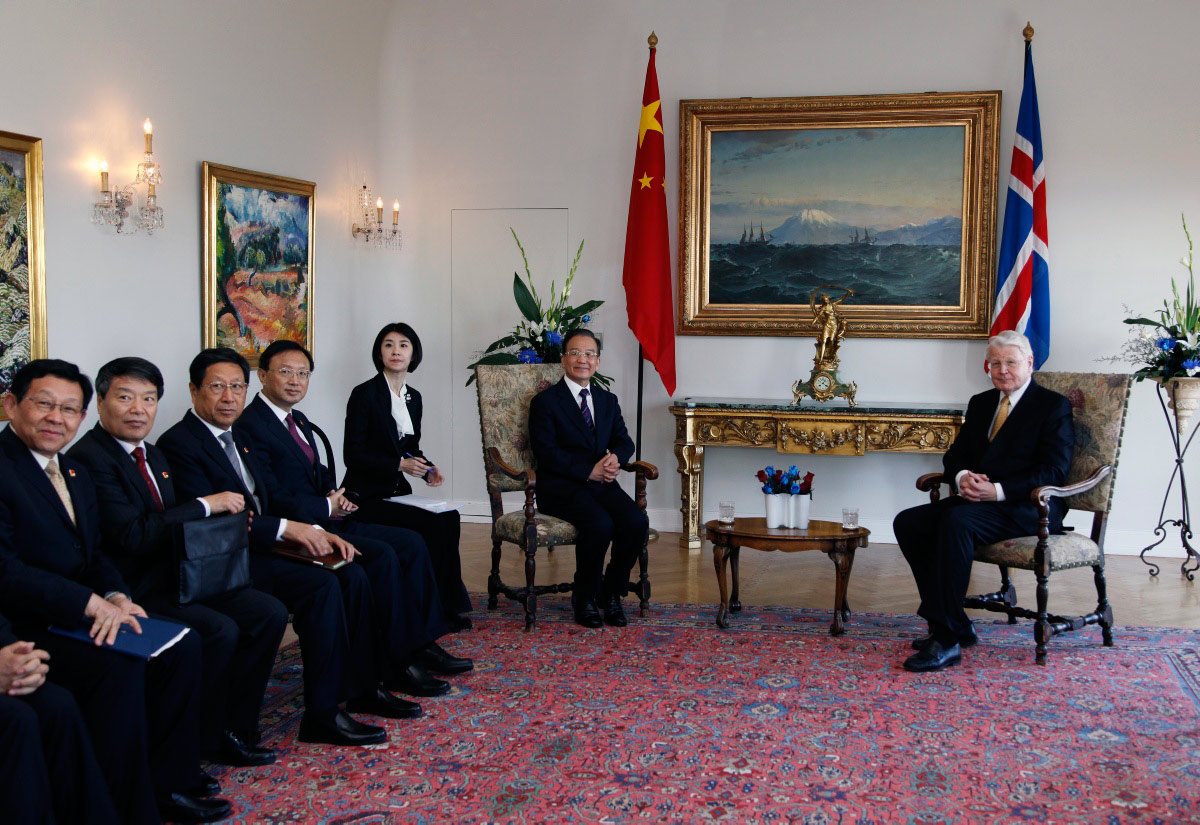
During the last years, you have made many contacts with chinese officials and traveled several times to China. Premier Wen Jiabao’s visited Iceland in april 2012. On the other hand, China is known to be diplomatically active in Arctic Affairs and rather upset about not yet having a Permanent Observer status in the Arctic Council. Would Iceland be offering a forward operating base to China ?
There has been no discussion on what you call ‘a forward operating base for China’. We are only engaged in normal diplomatic, scientific and economic co-operation as we are with many other countries, both in Europe, Asia and other parts of the world.
Could Iceland one day give a base for Chinese warships in the Arctic ?
No.
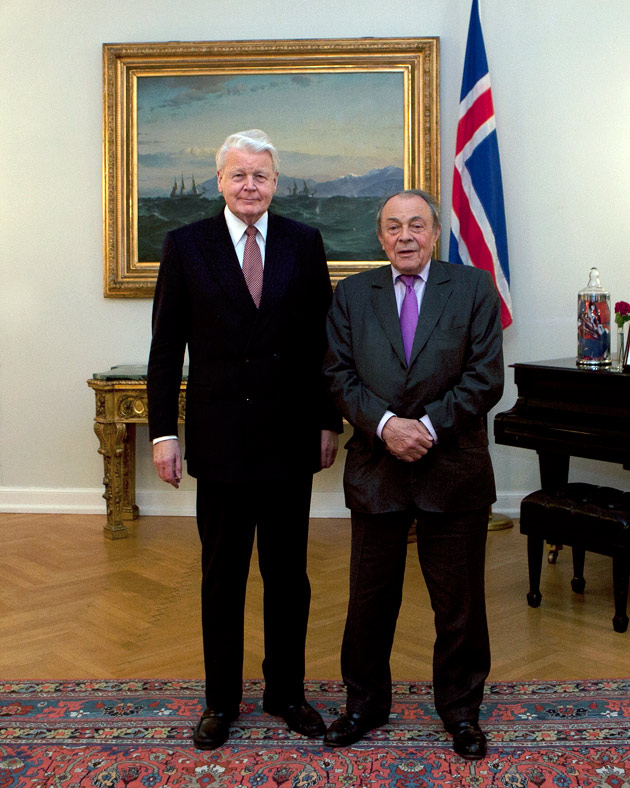
You are known to be one of the more open minded head of Arctic States concerning the inclusion of non Arctic States in the Arctic Council and the strengthening of international cooperation in the Arctic. The former Prime minister of France, currently ambassador of France to the Arctic and the Antarctic, Mr Michel Rocard, recently declared after his visit to Iceland in October 2012, that his friendship with President Grimsson and his good relationship with the icelandic government made Iceland the best Arctic partner for France. Do you yourself wish to reinforce cooperation with France and if it is the case, what are your expectations in terms of economic cooperation with our country ?
I have been privileged to host Michel Rocard, the former Prime Minister of France and the current Ambassador of France to the Arctic, in my country. In fact, he has visited Iceland twice in recent years and we have had a number of constructive discussions. I invited him to deliver a public lecture in the Presidential Lecture Series. In addition we have facilitated his dialogue with many Icelandic leaders, scientists and other knowledgeable people in this area. I believe that the visits by Michel Rocard to Iceland have been very constructive, helping to build a new relationship between France and Iceland with respect to the Arctic.
At which stage is the Iceland’s application for entry into the European Union ?
Although the Icelandic Parliament decided a few years ago to apply for membership in the European Union, influenced by the collapse of the banks and the financial crisis, there has now for a long time been a strong majority among the Icelandic public against membership. Although the negotiations have lasted a few years, they have not yet dealt with the most difficult parts, regarding e.g. fisheries, agriculture and natural resources. Therefore, there will be no significant conclusion in these negotiations prior to the Parliamentary elections which will take place in Iceland this year (1).
As a member of the European Economic Area do Iceland participate to the development of the Arctic Strategy of the European Union against the one of offensive neighboring countries as the United States, Canada or Russia ?
The Arctic Council, bilateral co-cooperation with the other Arctic countries, discussions with countries both in Europe, Asia and other parts of the world which are interested in Arctic issues, has been the framework within which Iceland has constructively approached Arctic issues.
Some begin to compare Iceland to Qatar: a tiny country whose influence grows both because of its geopolitical situation as its intense diplomatic action. What do you think about ?
Although this comparison might be of interest to some, I have not encountered it in my meetings and discussions. Iceland is, like Qatar and many other countries, a member of the family of small nations. All of us have something to learn from each other, although each has to deal with particular problems and challenges. I have been privileged to enjoy discussions with many representatives of Qatar, as well as other small countries in the Middle East. Similarly, representatives of many small nations have visited Iceland in order to learn from our experience. Thus, we all benefit from enhanced dialogue and co-operation.
(1) Iceland announced January 14, 2013, the suspension of negotiations on its accession to the European Union, in view of the elections in April 2013 which could bring to power a government skeptic and interrupt dialogue. (Source Reuters). This interview was conducted with Icelandic President in early January 2013, a few days before this official announcement.

